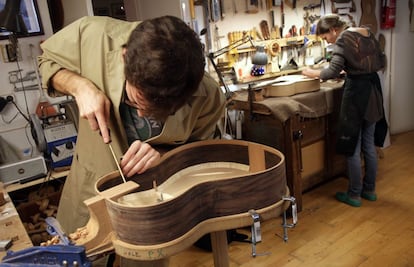The Spanish guitars that make history
Felipe Conde’s family has been creating its instruments in Madrid for the last 100 years

The basement of guitar-maker Felipe Conde smells of exotic tropical woods: cedar from Honduras, cypress, spruce and palo santo. The workshop, close to Madrid’s Teatro Real opera house, was founded a century ago, and Conde continues the family tradition, working with his son and daughter “without hurry and with a lot of freedom.” Among Conde’s customers are Leonard Cohen, jazz star Al Di Meola and, at one time, the late flamenco legend Paco de Lucía.
It can take up to two months of painstaking work to produce one of Conde’s six-string masterpieces
“I’m not interested in doing something I don’t want to: this has to come from inside you,” says Conde, who has been building guitars since he was 14 years old. Fortunately, his two children Felipe and María decided to continue the family tradition, working with him in the basement. “Every luthier has his own sound, because it depends on the touch of the hand and its ability to gauge the density of the wood,” says Conde.
It can take up to two months of painstaking work to produce one of Conde’s six-string masterpieces. “This is a job that you have to have a feel for. If you’ve had a bad night, it’s better to leave things alone. Any mistake in the construction of a guitar is irreversible,” he says.
Guitars are built based on time-honored principles and processes, but over time, somebody with the skills of Conde is able to imbue an instrument with something of their own personality. Felipe and María, his two children, aged 26 and 24 respectively, know this already. “When my brother finished his first guitar, I felt a curiosity to try making one as well,” says María, who now spends around eight hours a day in the workshop after finishing her degree in psychology. “I used to come to the workshop every afternoon, and I fell in love with this.”
“We have something very special here. Working with your hands is one of the best things there is in this life: this is quality of life,” she says before launching into an explanation of the virtues of the traditional glues used to make guitars. She says her father is a good man, but a tough boss: “He aspires to excellence, and the first thing he does is tell you everything you’ve done wrong.”
“We have something very special here. Working with your hands is one of the best things there is in this life: this is quality of life”
Conde’s son is studying music, and likes to listen while he works, adding that his profession gives him time to think. “This is a job that requires time: the customer understands and knows that a good guitar will take a while to make and that there is no choice but to wait until it’s finished,” he says, adding that the waiting list is long, but that he would like everybody on the planet to own a Conde guitar. The company has customers in the United States, Japan and Germany, and is receiving more and more requests from China, as well as Iran.
The story of Conde’s instruments is in large part the story of the guitar. Conde senior says Al Di Meola won’t let anybody else touch his guitar, while Leonard Cohen says the first chords he learned were on a Conde guitar owned by a Spaniard he met in his native Toronto. Paco de Lucía had all his guitars made here after he moved to Madrid in the 1960s, right up to his death in 2014. “He would turn up, try a couple of guitars and buy one of them,” says Conde. “I’ve inherited a tradition, but also the history of the artists who have played our guitars.”
Tu suscripción se está usando en otro dispositivo
¿Quieres añadir otro usuario a tu suscripción?
Si continúas leyendo en este dispositivo, no se podrá leer en el otro.
FlechaTu suscripción se está usando en otro dispositivo y solo puedes acceder a EL PAÍS desde un dispositivo a la vez.
Si quieres compartir tu cuenta, cambia tu suscripción a la modalidad Premium, así podrás añadir otro usuario. Cada uno accederá con su propia cuenta de email, lo que os permitirá personalizar vuestra experiencia en EL PAÍS.
¿Tienes una suscripción de empresa? Accede aquí para contratar más cuentas.
En el caso de no saber quién está usando tu cuenta, te recomendamos cambiar tu contraseña aquí.
Si decides continuar compartiendo tu cuenta, este mensaje se mostrará en tu dispositivo y en el de la otra persona que está usando tu cuenta de forma indefinida, afectando a tu experiencia de lectura. Puedes consultar aquí los términos y condiciones de la suscripción digital.








































